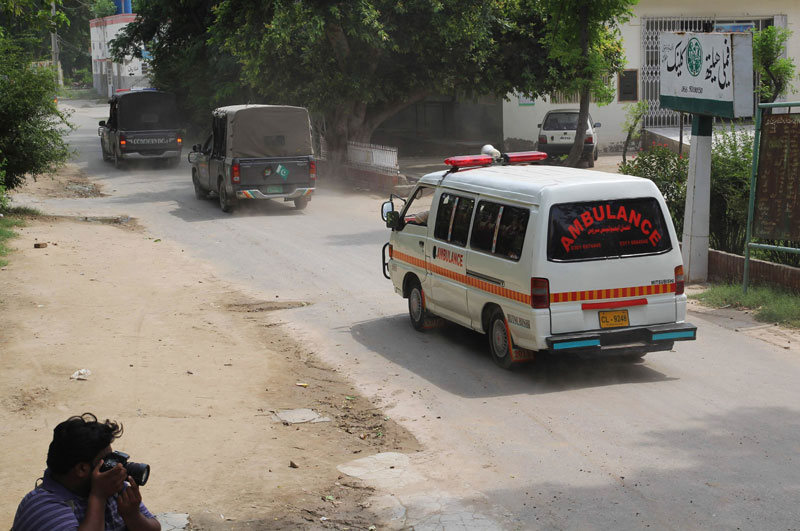Pakistani militant leader killed in police convoy attack
MUZAFFARGARH: One of Pakistan's most-feared Islamic militant leaders, believed to be behind the killing of scores of minority Shiites, was gunned down along with 13 other militants during an assault on a police convoy that was transporting him from prison on Wednesday.
Malik Ishaq, who directed the operations of the Taliban- and al-Qaida-linked Lashkar-e-Jhangvi group, was so feared in Pakistan that frightened judges hid their faces from him and even offered him tea and cookies in court.
Ishaq, believed to be either 55 or 56, operated freely for years in Pakistan as the country's intelligence services helped nurture Islamic militant groups in the 1980s and 1990s to maintain influence in Afghanistan and counter archrival India.
Ishaq had been detained by police two days earlier on suspicion of being involved in the slaying of two Shiites, police officer Bakhtiar Ahmed said.
Early Wednesday, as officers tried to transfer Ishaq from a prison in the eastern city of Multan, gunmen ambushed the convoy in an attempt to free him, Ahmed said. The ensuing gunbattle killed Ishaq and at least 13 of his associates, including two of his sons and his deputy, Ghulam Rasool, Ahmed said.
In a later statement, police said "14 or 15 unidentified armed terrorists" attacked police vehicles to free Ishaq when officers were returning from an area in nearby Muzaffargarh after seizing weapons, explosives and detonators on information provided by Ishaq and his associates.
It said Ishaq and five other detained militants were killed during the shootout by those who ambushed the convoy. They said eight of the attackers were killed in the gunbattle.
No other witnesses to the shooting could be immediately located. Ishaq's family members could not immediately be reached for comment. Pakistani police have been accused of extrajudicial slayings in the past, including through staged ambushes.
Shuja Khanzada, the provincial home minister in Pakistan's eastern Punjab province, where the fighting took place, said the shooting wounded six police officers who "demonstrated extreme bravery."
"Malik Ishaq was behind many acts of terrorism and he was freed by courts in the past due to lack of evidence," Khanzada told The Associated Press, calling him a "symbol of terror."
He said "many terrorists involved in heinous crimes often go unpunished because prosecutors don't have enough evidence against them. Malik Ishaq was one of such examples."
Imtiaz Gul, head of the Islamabad-based Center for Research and Security Studies, said the killing of Ishaq was a "very strong message to all those militants who were still pursuing the strategy of violence. Today's killing of 14 militants shows that the government will be very tough" in dealing with militant and sectarian groups.
Fearing violence in Punjab, long the home of Lashkar-e-Jhangvi, police mounted a heavy security presence around the province and the morgue in Muzaffargarh, where Ishaq's body and those of his associates were brought after the shootout.
Ishaq helped found Laskhar-e-Jhangvi in the 1990s, and the group later allied itself with al-Qaida and the Taliban. His group is blamed for scores of attacks on Shiites -- considered infidels by Sunni extremists -- and on Pakistani and U.S. interests. They've also been accused of carrying out attacks in neighboring Afghanistan. The U.S. State Department designated Ishaq as a terrorist in February 2014, ordering any U.S. assets he held frozen.
Ishaq was arrested in 1997 and accused in more than 200 criminal cases, including the killings of 70 Shiites. But the state could never make the charges stick — in large part because of the intimidation of witnesses, judges and prosecutors.
Frightened judges treated him honorably in court and gave him tea and cookies, said Anis Haider Naqvi, a prosecution witness in two cases against Ishaq who spoke to The Associated Press in 2011. One judge attempted to hide his face with his hands, but Ishaq made clear he knew his identity in a chilling way: He read out the names of his children, and the judge abandoned the trial, Naqvi said at the time.
Despite the lack of convictions, Ishaq remained in prison for 14 years as prosecutors slowly moved from one case to the next. Ishaq proved his usefulness to the army in 2009, when he was flown from jail to negotiate with militants who had stormed part of the military headquarters in Rawalpindi and were holding hostages.
A behind-the-scenes effort by the government to co-opt the leaders of militant outfits and bring them into mainstream political life, or at least draw them away from attacking the state, helped Ishaq secure his release in 2011. He had been in and out of police custody since.
Sunni-majority Pakistan has a Shiite minority that makes up about 15 percent of the population. Most Sunnis and Shiites live together peacefully in Pakistan, though tensions have existed for decades.
Pakistan has intensified its campaign against militant groups since December, when a Taliban attack on a military school in the northwestern city of Peshawar killed 150 people, mostly children.
The school attack also prompted the Pakistani government to lift its moratorium on the death penalty. It has executed scores of militants and other men charged in murder cases since then.






